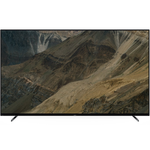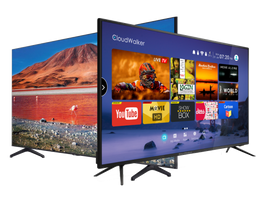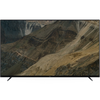A comparison of specs, key information, reviews, and best pricing from top retailers
Last updated -- hours ago | Report incorrect information
What we think

The PerfectRec TV team Learn more
Updated January 10, 2024·
If you prioritize overall picture quality, especially in darker environments, the Sony A80K (OLED) delivers superior performance with deeper blacks and vibrant colors. It also offers better motion processing and upscaling, making it excellent for movies and gaming, albeit at a premium price. If cost is a major factor and you watch a lot of content in well-lit rooms, the LG might be the better choice. Give Feedback
this description is based on the product variant with some specs and product variant with some specs. At the time of writing, the variant with some specs cost some dollars and the variant with some specs cost some dollars.
Advantages of the LG UR9000 (LCD)
- The LG UR9000 (LCD) has no clear advantages over the Sony A80K (OLED).
Advantages of the Sony A80K (OLED)
- Good for bright room
- Excellent for dark room
- Very good for gaming
- Excellent for movies & TV
- Excellent for sports
- Very good for news, talk, & other TV
- Very good for cartoons & animation
- Very good for use as monitor
- Best in class for upscaling
- Best in class motion processing
- Excellent viewing angle
- Very good reflections
Key differences
Picture Quality
5.4


8.6
3.31/10
CONTRAST
10.00/10
6.0/10
COLOR VOLUME SCORE
7.4/10
LED
PANEL TYPE
WOLED
IPS
PANEL SUB-TYPE
WBE
The Sony A80K (OLED) has very good picture quality, while the LG UR9000 (LCD) has poor picture quality.
Movies & TV
5.1


9.1
3.31/10
CONTRAST
10.00/10
5.3/10
BLACK UNIFORMITY
10.0/10
5.7/10
UPSCALING
10.0/10
Yes
HDR10 SUPPORT
Yes
No
HDR10+ SUPPORT
No
No
DOLBY VISION SUPPORT
Yes
The Sony A80K (OLED) is excellent for movies & TV, while the LG UR9000 (LCD) is poor.
Sports
6.8


9.2
8.0/10
MOTION PROCESSING
10.0/10
60Hz
REFRESH RATE
120Hz
10.0/10
INPUT LAG SCORE
7.0/10
5.7/10
UPSCALING
10.0/10
6.6/10
SDR BRIGHTNESS SCORE
7.0/10
Yes
HLG SUPPORT
Yes
The Sony A80K (OLED) is excellent for sports, while the LG UR9000 (LCD) is only fair.
The Sony A80K (OLED) is excellent for watching sports because it has superior motion processing and response time, ensuring clear images with little blur during fast action, and excellent handling of reflections, which improves visibility in well-lit rooms. In contrast, the LG UR9000 (LCD) is rated fair in the same categories, meaning it may not be as smooth in displaying motion and could be more affected by room lighting, impacting the viewing experience during sports events.
Gaming
5.7


8.8
6.0/10
RESPONSE TIME SCORE
9.4/10
10.0/10
INPUT LAG SCORE
7.0/10
8.0/10
MOTION PROCESSING
10.0/10
15.0/100
GAMING LOCAL DIMMING
100.0/100
6.3/10
GAME HDR BRIGHTNESS SCORE
7.0/10
The Sony A80K (OLED) is very good for gaming, while the LG UR9000 (LCD) is poor.
The LG UR9000, with its lower response time and slower input lag as compared to the Sony A80K, doesn't provide as smooth and responsive a gaming experience. Additionally, the A80K offers a higher refresh rate, ensuring that fast-moving visuals in games are clearer and more fluid on the Sony OLED than on the LG LCD.
Cartoons & Animation
5.8


8.5
5.8/10
COLOR GAMUT SCORE
8.1/10
6.0/10
COLOR VOLUME SCORE
7.4/10
6.6/10
SDR BRIGHTNESS SCORE
7.0/10
8.5/10
COLORS OUT OF THE BOX SCORE
8.0/10
7.7/10
GRAY UNIFORMITY
9.6/10
The Sony A80K (OLED) is very good for cartoons & animation, while the LG UR9000 (LCD) is poor.
The LG UR9000's LCD screen has a poor color gamut which affects the vibrancy and range of colors, making it less ideal for cartoons and animation that typically benefit from rich and accurate colors. On the other hand, the Sony A80K, with its OLED display, provides a very good color gamut and color out of the box, delivering the vividness and depth that make animated content pop.
News, Talk, & Other TV
5.5


8.9
6.6/10
SDR BRIGHTNESS SCORE
7.0/10
5.7/10
UPSCALING
10.0/10
The Sony A80K (OLED) is very good for news, talk, & other TV, while the LG UR9000 (LCD) is poor.
The LG UR9000's lower upscaling quality and fair SDR brightness may lead to a less clear and dimmer picture when watching news or talk shows, while the Sony A80K's excellent upscaling and good SDR brightness ensure a sharper and more vivid display suitable for these programs. Additionally, the A80K's superior colors out of the box and wider color gamut contribute to a richer and more accurate color reproduction compared to the UR9000.
Bright Room
5.8


7.0
7.4/10
VIEWING ANGLE
9.1/10
6.6/10
SDR BRIGHTNESS SCORE
7.0/10
6.2/10
HDR BRIGHTNESS SCORE
6.8/10
6.6/10
REFLECTIONS SCORE
8.9/10
The Sony A80K (OLED) is good for bright room, while the LG UR9000 (LCD) is poor.
The LG UR9000 has lower SDR and HDR brightness and poor handling of reflections, making it less suitable for bright rooms, contrastingly, the Sony A80K offers better brightness in both SDR and HDR and very good reflection handling, maximizing visibility in well-lit environments. Both have substantial contrast and color performance, with the Sony A80K excelling in these areas due to its OLED technology, which further enhances its suitability for brighter rooms compared to the LG's LCD display.
Cost
$547


$1,698
$0
$500
$1,000
$1,500
$2,000
$2,500
$3,000
The LG UR9000 (LCD) has a price of $547 and the Sony A80K (OLED) costs $1,698.

Let Us Help Find Your Perfect TV
Find your new TV
Give feedback
We’re constantly working to improve.
How the LG UR9000 (LCD) and the Sony A80K (OLED) compare to other TVs
Spec Comparison
| LG UR9000 (LCD) | Sony A80K (OLED) |
GENERAL | |||
|---|---|---|---|
| Price | |||
$547 | $1,698 | ||
Brand | |||
Brand | LG | Sony | |
Release Date | |||
Release Date | March 4, 2023 | June 2, 2022 | |
Full name | |||
Full name | 65UR9000 | XR-65A80K | |
Screen Size | |||
Screen Size | 65" | 65" | |
Screen Resolution | |||
Screen Resolution | 4K | 4K | |
TV FEATURES | |||
|---|---|---|---|
Operating System | |||
Operating System | WebOS | Android TV | |
Sound Quality Score | |||
Sound Quality Score | 5.4/10 | 8.9/10 | |
NextGen Ready | |||
NextGen Ready | No | Yes | |
HDMI Ports | |||
HDMI Ports | 3 | 4 | |
Coax Ports | |||
Coax Ports | 1 | 1 | |
DISPLAY QUALITY SCORES | |||
|---|---|---|---|
Picture Quality Score | |||
Picture Quality Score | 5.5/10 | 8.7/10 | |
Bright Room Score | |||
Bright Room Score | 5.9/10 | 7.1/10 | |
Gaming Score | |||
Gaming Score | 5.8/10 | 8.8/10 | |
Movies & TV Score | |||
Movies & TV Score | 5.1/10 | 9.1/10 | |
Sports Score | |||
Sports Score | 6.8/10 | 9.2/10 | |
PHYSICAL | |||
|---|---|---|---|
Dimensions w/o Stand (H x W x D) | |||
Dimensions w/o Stand (H x W x D) | 33.1" x 57.3" x 1.2" | 33" x 57.1" x 2.1" | |
Dimensions with Stand (H x W) | |||
Dimensions with Stand (H x W) | 35.6" x 57.3" | 33.9" x 57" | |
Weight without Stand | |||
Weight without Stand | 52 lbs | 50.7 lbs | |
VESA Mount | |||
VESA Mount | 300 x 300 | 300 x 300 | |
DISPLAY | |||
|---|---|---|---|
Color Depth | |||
Color Depth | 10 bit | 10 bit | |
Black Frame Insertion | |||
Black Frame Insertion | No | Yes | |
Auto Low Latency Mode | |||
Auto Low Latency Mode | Yes | Yes | |
Contrast | |||
Contrast | 3.3/10 | 10/10 | |
Local Dimming | |||
Local Dimming | 3.3/10 | 10/10 | |
SOUND | |||
|---|---|---|---|
Speaker Setup | |||
Speaker Setup | 2.0 | 3.2 | |
Speaker Power | |||
Speaker Power | 20 W | 50 W | |
Dolby Atmos | |||
Dolby Atmos | Bypass only | Yes | |
DTS:X | |||
DTS:X | No | Up to DTS Digital Surround, Bypass only | |
Shopping
Sony A80K (OLED)
See more
Dig into reviews and images
USA Today
Michael Desjardin | December 2022
"It’s a high-end TV through and through something that becomes clear the moment you glance at its stunning picture. The A80K’s surgically precise contrast control is likely the first thing you’ll notice about its picture ... every piece of content looks better when this amount of precision is available. Color accuracy is another strong suit; the A80K features fantastic out-of-the-box color accuracy in the Custom picture mode."
Get a great deal on the LG UR9000 (LCD) or the Sony A80K (OLED)
About LG
LG, a prominent TV brand from Korea, has played a significant role in popularizing OLED TVs. OLED technology is hailed as the future of TV technology. Their TVs employ WebOS, a proprietary smart TV software that not only offers seamless functionality but also includes gaming-specific features, earning praise from players worldwide. Often regarded as the gateway to unparalleled viewing experiences, LG's mid-range OLEDs come highly recommended, making them a worthwhile investment for those willing to stretch their budget for superior quality.
About Sony
Sony stands as a highly experienced and widely trusted TV manufacturer, earning a reputation that surpasses all others. A Japanese company, Sony has been making TVs for far longs than it has been making Playstation game consoles. Sony's high-end TVs are often regarded as the ultimate choice for videophiles, representing the epitome of quality, albeit at a premium price point. Renowned for their advanced and precise motion handling, as well as their cutting-edge local dimming algorithms, Sony consistently delivers unparalleled performance in these areas. They include Google TV software with all their TV sets, which grants access to the largest selection of apps available and they also include Bravia Core which is a movie streaming platform specifically for Sony TVs that offers higher picture quality by using more bandwidth.
Give feedback
We're constantly perfecting our model
TV guides you might be interested in
More comparisons for you
FAQs
FAQs about TVs
Why trust us
This information was produced and vetted by the PerfectRec TVs team. We are a product research and recommendation organization that meticulously reviews and evaluates the latest TV information and makes it digestible for you.
By the numbers
385
TVs evaluated
33,110
TVs stats compiled
21
Proprietary TVs ratings developed
122,730
Recommendations made
18,410
Consumer hours saved
About the TV team
Joe Golden, Ph.D
CEO and TVs Editor
Joe is an entrepreneur and lifelong electronics enthusiast with a Ph.D in Economics from the University of Michigan.
Jason Lew
Staff Expert & Software Engineer
Jason is a staff expert and software engineer that has been making laptop recommendations for 7 years and moderates one of the largest laptop subreddits.
Chandradeep Chowdhury
Staff Expert & Software Engineer
Chandradeep is a staff expert and software engineer and expert in televisions and monitors. He’s been making monitor recommendations for ten years.
Jaime Roldán
TVs Expert
Jaime is a Colombia-based TV expert. He is an electronics engineer with 8 years of experience in the telecom sector and has been making TV recommendations for 12 years.







